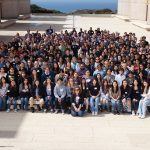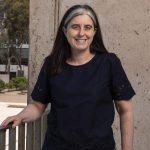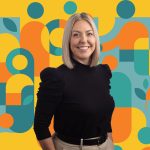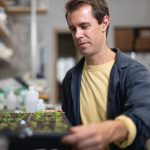Research led by Satchidananda Panda, with first author Gabriele Sulli, showed how to curb cancer cell growth by blocking the cells’ access to nutrients. The key is the circadian cycle, the intrinsic clock that exists in all living things and helps control when individual cells produce and use nutrients. The team focused on REV-ERBα and REV-ERBβ, proteins that are part of the clock’s machinery and modulate cells’ ability to synthesize fats and recycle materials. Since cancer cells rely heavily on both of these processes to grow, the researchers thought activating REV-ERBs might slow that growth. Panda’s team used two activating drugs on a variety of cancer cells, including T cell leukemia, breast, colorectal, melanoma and glioblastoma. In each line, the drugs were able to kill the cancer cells, but had no effect on healthy cells.
Salk scientists curb growth of cancer cells by blocking access to nutrients
Featured Stories
 What’s next for GLPs? Salk scientists are shaping the future of weight-loss medicineSalk researchers are breaking metabolism down piece by piece. Their recent discoveries could help reduce the side effects of GLP-1 drugs and inspire the next generation of weight management therapies.
What’s next for GLPs? Salk scientists are shaping the future of weight-loss medicineSalk researchers are breaking metabolism down piece by piece. Their recent discoveries could help reduce the side effects of GLP-1 drugs and inspire the next generation of weight management therapies. Science comes alive for high schoolers and educators at SalkSalk’s annual High School Science Day had the highest participation in the event’s history, as 205 excited students were welcomed onto campus. Teachers also had a day of their own at the Ellen Potter Teacher Symposium, learning side-by-side with world-renowned scientists.
Science comes alive for high schoolers and educators at SalkSalk’s annual High School Science Day had the highest participation in the event’s history, as 205 excited students were welcomed onto campus. Teachers also had a day of their own at the Ellen Potter Teacher Symposium, learning side-by-side with world-renowned scientists. Nicola Allen: Neuroscience has a new starAs her recent promotion and awards reflect, Allen has led a paradigm shift in neuroscience by turning the field's spotlight onto astrocytes. These specialized brain cells could be the missing piece to understanding Alzheimer's and other neurological diseases.
Nicola Allen: Neuroscience has a new starAs her recent promotion and awards reflect, Allen has led a paradigm shift in neuroscience by turning the field's spotlight onto astrocytes. These specialized brain cells could be the missing piece to understanding Alzheimer's and other neurological diseases. Michelle Chamberlain: Bringing together communities old and newChamberlain, whose lifelong commitment to others has shaped her journey to Salk, now serves as Salk’s vice president of External Relations, leading fundraising, communications, community engagement, foundation relations, and stewardship efforts.
Michelle Chamberlain: Bringing together communities old and newChamberlain, whose lifelong commitment to others has shaped her journey to Salk, now serves as Salk’s vice president of External Relations, leading fundraising, communications, community engagement, foundation relations, and stewardship efforts. Joseph Swift: Saving potatoes, one road trip at a timeSwift, a plant biologist and startup co-founder, had an adventurous upbringing in Australia filled with natural beauty. Today, he uses plant genomics to tackle urgent questions in sustainability and agriculture.
Joseph Swift: Saving potatoes, one road trip at a timeSwift, a plant biologist and startup co-founder, had an adventurous upbringing in Australia filled with natural beauty. Today, he uses plant genomics to tackle urgent questions in sustainability and agriculture.





















































